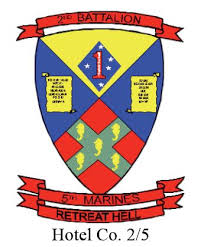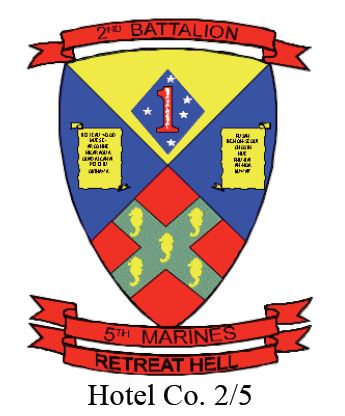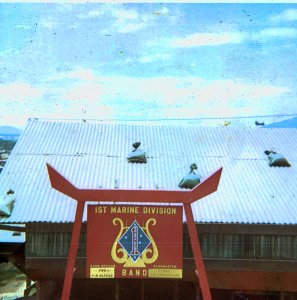 After being on the road in a convoy for 2.5 hours, the Sgt Major, his driver, and I arrived at the Da Nang 1st Marine Division Band facility. After the jeep stopped, Sgt Major Burks said, “I’ll be back to get you in about 12 days. Make me proud and learn those music notes!” I stood there with my gear and said “Yes, Sir.” as the jeep drove away. I walked into the building there and met the band officer of the 1st Marine Corps Division Band. I had no idea what was going on. I told the band officer that I was just dropped off by my Sgt Major from 2/5. He said, “ya, ya, Burks called me about a week ago and asked if I still had that new bugle I received from the states”. “He told me that he had a new battalion bugler coming to get it and to teach him the bugle calls.” “Congratulations son, you are the new 2/5 battalion bugler!” I was in shock. I asked the officer if I could speak. “Of course!” he said.
After being on the road in a convoy for 2.5 hours, the Sgt Major, his driver, and I arrived at the Da Nang 1st Marine Division Band facility. After the jeep stopped, Sgt Major Burks said, “I’ll be back to get you in about 12 days. Make me proud and learn those music notes!” I stood there with my gear and said “Yes, Sir.” as the jeep drove away. I walked into the building there and met the band officer of the 1st Marine Corps Division Band. I had no idea what was going on. I told the band officer that I was just dropped off by my Sgt Major from 2/5. He said, “ya, ya, Burks called me about a week ago and asked if I still had that new bugle I received from the states”. “He told me that he had a new battalion bugler coming to get it and to teach him the bugle calls.” “Congratulations son, you are the new 2/5 battalion bugler!” I was in shock. I asked the officer if I could speak. “Of course!” he said.
“There must be some mistake, I’ve never played a bugle”, I said. I played the trombone for five years in school in the marching band. The band officer, CWO-4 A. M. Clesak started to laugh, and said, “I know Burks, “He wouldn’t know the difference from a bugle, a trumpet, a trombone, or a tuba”. “I guess you’ve got a lot of work to do to get that lip in shape to play that bugle.”
I couldn’t believe this was happening to me. The band officer left me alone for most of the days I was there. He gave me some sheet music for eight bugle tunes. He asked if I knew how to read sheet music and I said yes. So, for the next four days, I blew and blew on a brand-new bugle playing the sounds and memorizing them. The bugle had the letters USMC inscribed on the bell of the bugle’s horn. There was no instrument case. I found someone’s green tee-shirt laying around, so I used it to wrap up the bugle when I wasn’t practicing with it.
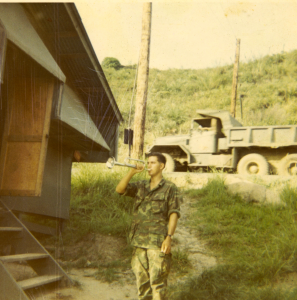 For those of you who have played a brass instrument, you know that it takes many weeks to get your lip muscles built up tight enough to make a good sound/tone. My problem was that I played a trombone with a much larger mouthpiece and this bugle’s mouthpiece was extremely smaller than I was used to. After my first eight hours of practicing, my lips were shot.
For those of you who have played a brass instrument, you know that it takes many weeks to get your lip muscles built up tight enough to make a good sound/tone. My problem was that I played a trombone with a much larger mouthpiece and this bugle’s mouthpiece was extremely smaller than I was used to. After my first eight hours of practicing, my lips were shot.
Wow, I only had 12 days to get my lips in shape and have these tunes memorized. I knew I could do it. I asked the band officer what a battalion bugler does. He looked at me and said, he plays these notes when the battalion is marching in a parade. He said, “Hell if I know what Sgt Major Burks has in mind when you get back to your outfit”. “Nobody in the Marine Corps in Vietnam has a battalion bugler.” “The 1st Marine Division has a band, and we use a trumpet for playing Taps here in Da Nang”. I explained that I was a combat 0311 rifleman and needed to get back to my combat unit. The Sgt Major must have made a mistake?
I practiced hard every day. I memorized eight songs within the first four days of being there. After dinner in the mess hall on day four, the band officer comes to me and said, “Hope you memorized those tunes, Sgt Major Burks will be picking you up tomorrow and taking you back to Phu Loc 6”. “Take that sheet music with you, your days here with us are over.” Sure enough, I was picked up by the Sgt Major and his jeep driver at 11:00 hours the next morning. I thought I was going to get eight more days of practicing before I had to leave the 1st Marine Division Band compound. I was there only five days total.
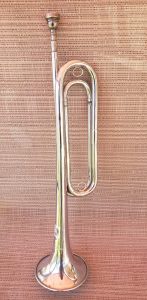 Sgt Major Burks wanted to see the new bugle. I unwrapped it from the tee-shirt and showed it to him while we were riding in the jeep on the way back to An Hoa. He explained that he wanted to hear the bugle being played many times a day while we were at Liberty Bridge, Phu Loc 6. ‘Reveille’ at the break of dawn, flag raising at 08:00, ‘Mess Call’ to announce mess hall is open at breakfast, lunch, and dinner, ‘To the Color’ when the flag was lowered at dusk, ‘Call to Quarters’ for lights out at 22:00 hours, ‘Taps’ when requested.
Sgt Major Burks wanted to see the new bugle. I unwrapped it from the tee-shirt and showed it to him while we were riding in the jeep on the way back to An Hoa. He explained that he wanted to hear the bugle being played many times a day while we were at Liberty Bridge, Phu Loc 6. ‘Reveille’ at the break of dawn, flag raising at 08:00, ‘Mess Call’ to announce mess hall is open at breakfast, lunch, and dinner, ‘To the Color’ when the flag was lowered at dusk, ‘Call to Quarters’ for lights out at 22:00 hours, ‘Taps’ when requested.
Besides these formal bugle calls, he wanted me to arbitrarily play any notes, make them up as I went along and play them in small bursts. What? Really? What was this about? After my first night at Phu Loc 6, the Sgt Major came up to me, sat down and explained what my purpose was being the new battalion bugler and what his goal was concerning usage of the bugle. I got quite the education about the importance of using bugles in the military.
Bugles and trumpets can be found in the Bible and in early writings of troops being marched to martial blasts and of trumpets used in ceremonial rituals. Bugles have been used in most wars throughout history. They were even used in WWI and WWII. To my surprise, he told me that they were being used daily in this war to communicate between NVA troops.
The NVA North Vietnamese Army Assault Attack Bugle is approx. 11 1/2” long with a removable mouthpiece. It is a brass bugle, usually without any markings, used by the NVA when attacking an enemy. There was also a Chicom mfg. (Chinese Communist Army) NVA VC issued bugle. This type of bugle was commonly used by North Vietnamese regulars, Viet Cong gorillas, Pathet Lao, and Cambodian Communists.
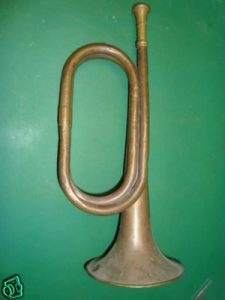 The enemy soldiers used the bugle as a means of communication while in the field. They were used for rallying the troops and issuing commands, to attack or withdraw. This is a typical example of one of several different variations of bugles that were produced for the Chinese Army and supplied to the North Vietnamese during the war. It was made of brass (tarnished with a light brown patina). Some of these bugles were marked with “MADE IN CHINA” written on it.
The enemy soldiers used the bugle as a means of communication while in the field. They were used for rallying the troops and issuing commands, to attack or withdraw. This is a typical example of one of several different variations of bugles that were produced for the Chinese Army and supplied to the North Vietnamese during the war. It was made of brass (tarnished with a light brown patina). Some of these bugles were marked with “MADE IN CHINA” written on it.
Liberty Bridge was located at Phu Loc 6. The USMC command bunker was built underground with metal, wood, and thousands and thousands of sandbags, and located on the south side of the bridge. The bridge was located to the west of GO Noi Island where the NVA had their headquarters and operated from underground tunnels and bunkers. Anytime, day and night in the distance, you could hear a bugle or two blasting away from the enemy’s camp. The NVA relied upon bugle signals because they didn’t have the radio technology like we had for communicating to one another.
Sgt Major Burks’ idea was for me to sit on top of a bunker all day and just blow my bugle making up any sounds whenever the enemy blew theirs to confuse them. They only blew their bugles five or six times a day. There was no set time that I could figure out. In addition, I provided the bugle calls I had learned for the events happening at Liberty Bridge daily.
The first two days of playing my bugle went well. I did my thing, and no one said anything to me, not even the Sgt Major. Early morning on day three, however, was a different experience. As I stood tall on top of the highest bunker at Phu Loc 6 and began to play, suddenly and unexpectedly, “crack, crack, crack” sounds from an AK47 and bullets came flying past my head. I was being shot at by the NVA. I jumped down off the spot I was standing and took cover. A few minutes later, I heard the NVA bugle sounds in the far distance. I laid down on my back on the floor of the bunker with four feet of sandbags around me, pointed the bugle up into the air and did my little concert thing for about five minutes. I could still hear bullets flying over me and some of them hitting the bunker in front of me. This went on for the rest of the week except, I wasn’t only getting shot at by the NVA, there was also M16 friendly fire coming from across the river shooting at me.
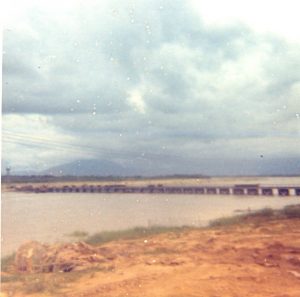 I began to think of ways to get out of this mess. I thought I’d throw the bugle over the rail of Liberty Bridge and tell the Sgt Major some made up story. I even thought I’d take my M16 and shoot a hole in the bugle and tell him I got shot at. But, I didn’t do any of those things. Instead, I kept playing the bugle.
I began to think of ways to get out of this mess. I thought I’d throw the bugle over the rail of Liberty Bridge and tell the Sgt Major some made up story. I even thought I’d take my M16 and shoot a hole in the bugle and tell him I got shot at. But, I didn’t do any of those things. Instead, I kept playing the bugle.
After a few days, I went to the Sgt Major to explain what I was experiencing, but he told me he was too busy to have any conversation with me. I waited all day up on that bunker, playing my bugle less often. That night at the end of my duty time, I went to my sleeping quarters and sat down and wrote the Sgt Major a quick note. The note simply said, “Please meet me up on the bunker tomorrow morning, I need for you to see something. This is very important!” I gave it to someone to give to the Sgt Major.
To my surprise, he showed up the next morning. I asked him to get down and take cover. He got mad at me for giving him an order. So, I immediately stood up, began playing reveille and all hell broke lose. AK 47’s opened up and so did several M16’s. Bullets were bussing past our heads. Both the Sgt Major and I took cover. He grabbed my arm and held on to my shirt for a few seconds and began cussing me out like I had never experienced before. I had never ever heard any of those very, very bad swear words. I was in shock. I had no idea someone could cuss like that. Even my drill instructors back in boot camp didn’t use all those expletives! I knew I was going to be court marshalled. While we were still both laying prostrated flat on the bunker floor lying next to each other, with bullets flying over our heads, he broke out in laughter. I broke out in tears.
About 10 minutes went by before we began to climb down off the bunker and went back into the CP. I was ready to stand at attention, be dressed down, and busted back to private. However, he took the bugle from me, looked it all over, handed it back to me and said, “I guess that wasn’t such a good idea having a battalion bugler out here in the bush!” He then said, put it away in your seabag, take it home to the states as a souvenir, and tell your grandchildren someday that you were a battalion bugler in the war. My role of being the battalion bugler lasted one full week. I wrapped the bugle up into that old green tee shirt and placed it into the middle of my seabag. It arrived safely back in the states.
Sgt Major Burks then said, “I know you need to stay busy so I’ll give you back a radio to carry around, and you can help with the mail and take the mail out into the field to our guys”. That same day, the Sgt Major introduced me to the battalion commander Lt. Col James H. Higgins. By now, I figured out that the Sgt Major sort of favored me. But I didn’t know why I was getting a radio back. I just understood that my new job was to play mailman. I kept wondering, when am I going to get back to Hotel Company and be out in the bush with my guys?
Larry D. Tyler
0311
